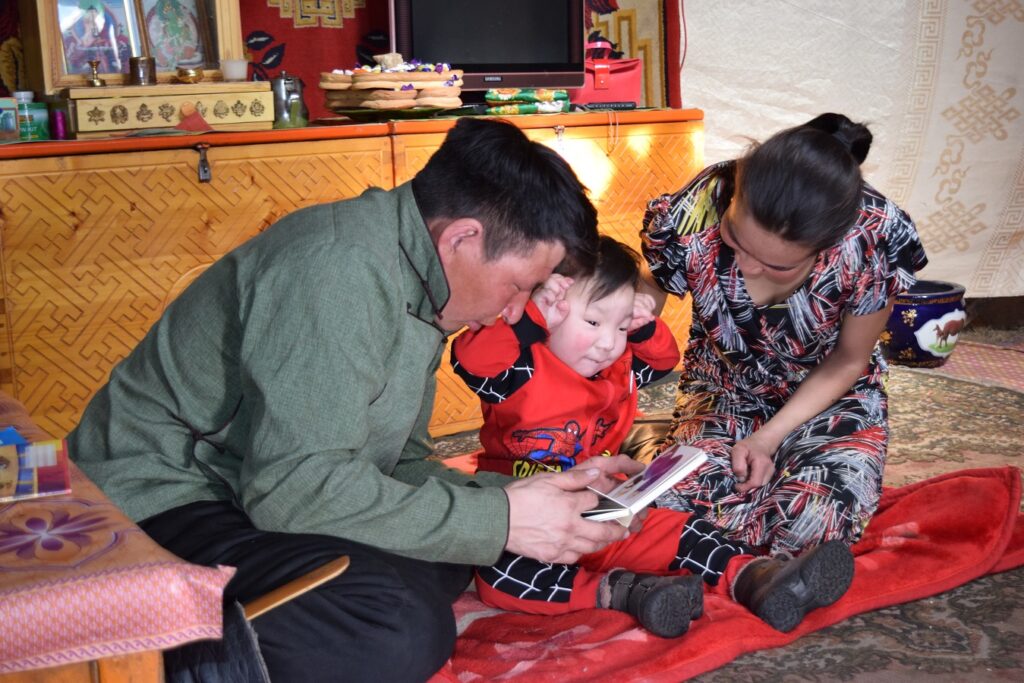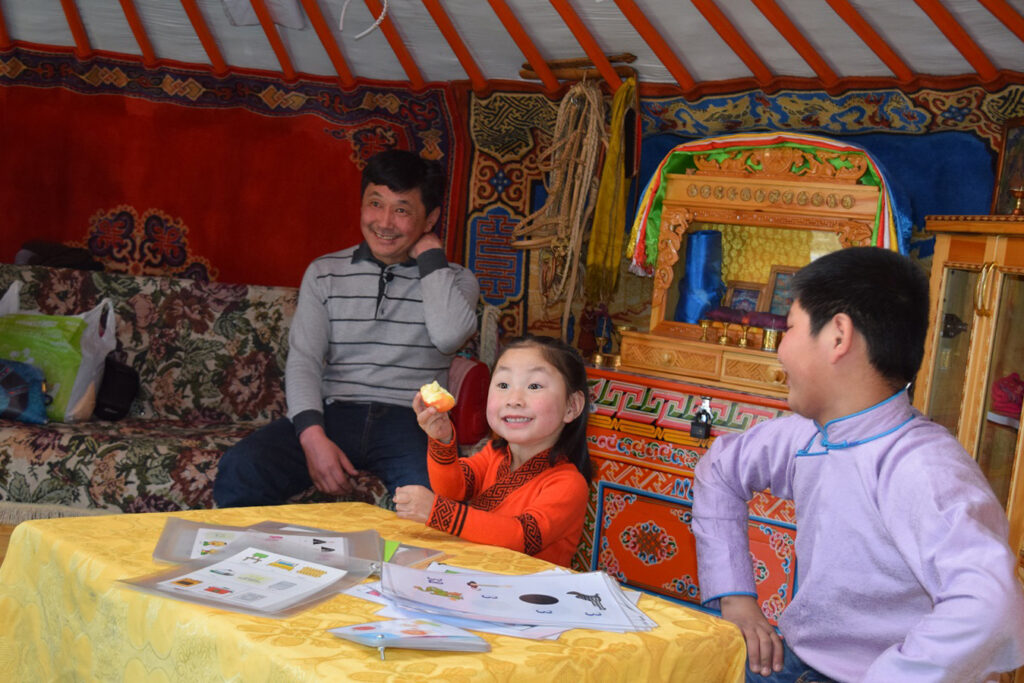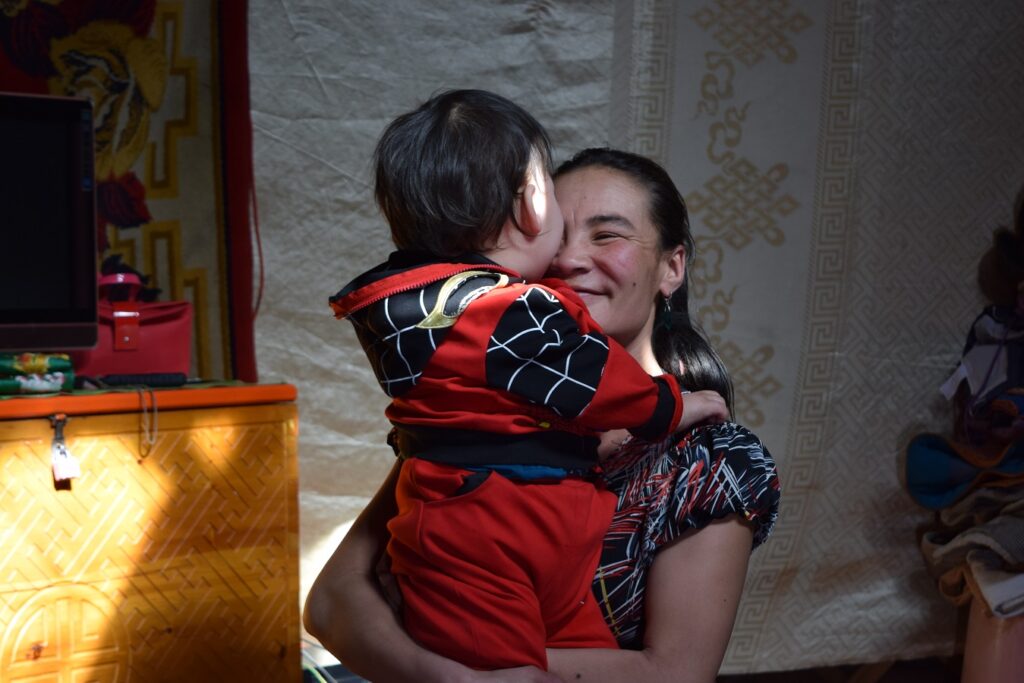Lost education, chance given

Constraints incurred from an education left behind
During the transition to a market economy in the 1990s many children in Mongolia dropped out of school: some went for work, some started helping parents with herding livestock. This had a number of negative impacts on their further lives. Nowadays, those children who did not complete their education, have become parents themselves, and are facing difficulties in raising and educating their own children. In particular, they are not able to fully support and help their children in learning because of their own limited literacy education. Yet children with disabilities require much more attention and support from parents. In rural areas, many parents with young children or children with disabilities are unaware how to communicate with or to develop their own children, and where to seek assistance. There are parents who do not know their birthday, are ashamed to communicate with others, and even try to stay away from public places like a bank, shop or hospital.
Need for improving the level of education
While implementing the project “Promoting Inclusive Education for Every Last Child” in the years of 2018-2021, Save the Children identified children with disabilities from the target areas. The survey identified parents who were not literate and were limited in socialization skills. Taking this into account in 2021, another survey was conducted among 143 residents living in Arvaikheer, Kharkhorin and Uyanga soums of Uvurkhangai province. The results revealed interesting data on parents and guardians who had children with disabilities aged below 16 and who were herding animals or were unemployed. For example, 35% out of 134 fathers involved in the survey, had only completed primary education or had not received any education, and 26,9% had taken some incomplete basic education. 54,1% of all surveyed parents were unemployed or were herding animals. Also 65% of the children surveyed were young, aged below 11. It was obvious that in remote rural areas special attention is required to improving education of unemployed parents of children with disabilities or children who need permanent care.
Project that provided equal opportunities for education
To help parents identified within the survey, the Save the Children successfully implemented the project “Improving Literacy and Numeracy Skills of Herder Parents of Children with Special Needs” with the support of Australian Volunteer Program from June 2021 till April 2022 in Uvurkhangai province. 60 parents of children with special needs were selected for the training which was organized according to a specially designed comprehensive program in cooperation with the provincial Life-long Education center and Arvaikheer, Kharkhorin and Uyanga soum Life-long education units. The training program aimed to develop parents’ literacy and numeracy skills along with improving skills of working with children through a distance and mobile mode of training. Supporting the education of parents of children with disabilities was the first and newest initiative in a particular local area.
Parents are getting educated
Trainees involved in the project have been improving numeracy, literacy skills and as well as skills for supporting and developing children with disabilities in the family environment. In addition, an important part of the training program was the active engagement of local government, non-government, and private organizations who assisted in providing trainees with life skills.
Herder parent B.Rentsen from Arvaikheer soum, Uvurkhangai province commented:
“We have five children. My youngest son got epilepsy because of a stroke in his head during birth. I dropped out of the third year of schooling and started herding animals. Therefore, I remained illiterate. Since I have been involved in the project run by the Save the Children, I am successfully taking literacy training. I love learning. Although it is a bit embarrassing to learn reading and writing by sitting with my children, I try my best.” While saying that, she was showing her notebook with accurate and neat writing. This example proves that the project has really reached the right targets. “It is nice to learn with others”, she continued. “I used to cook for children, send them to school and then had some housework before, but now I have classmates, 3 to 4 hours of learning to do a day, have a joy and laughter with others, all of which make me feel that I have a refreshed mind. Sometimes when my husband is busy working, I stay at home with my son, and trainers come to my house to teach me. This is a great support for me. It is possible to learn at home and take care of my son. If you always stay at home, you feel distressed. I realized that I should not abandon myself and think it is too late to learn. Now I am inspired to get educated. Learning to socially communicate with people is really important. Before, I used to stay at home looking after my children, never had communication with others and could not express myself which was a serious issue.”
Herder parent Ts.Munkhbayar from Kharkhorin soum is one of those who are involved in the project. He said, “Previously I thought that at my age it was not possible to learn reading and writing at all. Therefore, learning seemed, to me, meaningless. But every time I went to the soum center for different purposes like to visit a bank or hospital for checking my children’s health, I always thought that I needed to learn reading and writing, however I had no idea how to do it. Fortunately, my family received some assistance from the local community, I am involved in the project, I have a teacher who comes to teach me, or sometimes I go to the soum center for learning. Now I can join syllables, write my signature and make some calculations.” Also, Ts.Munkhbayar’s wife N.Dulamsuren expressed her happiness by saying, “I usually stayed at home looking after my children. Although I occasionally went to the soum center, I was not able to count cash and write my signature; that is why I did not go to the shop. Now I am involved in the project and am learning along with my husband. It is hard to believe that I am able to read and write, send my child to school, and teach my child the alphabet. It feels very good.”
The project “Improving Literacy and Numeracy Skills of Herder Parents of Children with Special Needs” is providing a number of benefits for herders like B.Rentsen, Ts.Munkhbayar and N.Dulamsuren. Save the Children is collaborating with local partners in other areas as well to get more children and parents to benefit from this project.
- B.Rentsen’s family
- N.Dulamsuren and her child



